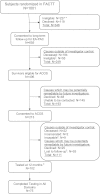The adult respiratory distress syndrome cognitive outcomes study: long-term neuropsychological function in survivors of acute lung injury
- PMID: 22492988
- PMCID: PMC3381234
- DOI: 10.1164/rccm.201111-2025OC
The adult respiratory distress syndrome cognitive outcomes study: long-term neuropsychological function in survivors of acute lung injury
Abstract
Rationale: Cognitive and psychiatric morbidity is common and potentially modifiable after acute lung injury (ALI). However, practical measures of neuropsychological function for use in multicenter trials are lacking.
Objectives: To determine whether a validated telephone-based neuropsychological test battery is feasible in a multicenter trial. To determine the frequency and risk factors for long-term neuropsychological impairment.
Methods: As an adjunct study to the Acute Respiratory Distress Syndrome Clinical Trials Network Fluid and Catheter Treatment Trial, we assessed neuropsychological function at 2 and 12 months post-hospital discharge.
Measurements and main results: Of 406 eligible survivors, we approached 261 to participate and 213 consented. We tested 122 subjects at least once, including 102 subjects at 12 months. Memory, verbal fluency, and executive function were impaired in 13% (12 of 92), 16% (15 of 96), and 49% (37 of 76) of long-term survivors. Long-term cognitive impairment was present in 41 of the 75 (55%) survivors who completed cognitive testing. Depression, post-traumatic stress disorder, or anxiety was present in 36% (37 of 102), 39% (40 of 102), and 62% (63 of 102) of long-term survivors. Enrollment in a conservative fluid-management strategy (P = 0.005) was associated with cognitive impairment and lower partial pressure of arterial oxygen during the trial was associated with cognitive (P = 0.02) and psychiatric impairment (P = 0.02).
Conclusions: Neuropsychological function can be assessed by telephone in a multicenter trial. Long-term neuropsychological impairment is common in survivors of ALI. Hypoxemia is a risk factor for long-term neuropsychological impairment. Fluid management strategy is a potential risk factor for long-term cognitive impairment; however, given the select population studied and an unclear mechanism, this finding requires confirmation.
Figures


Comment in
-
The effect of hypoxia-hypercapnia on neuropsychological function in adult respiratory distress syndrome.Am J Respir Crit Care Med. 2012 Dec 15;186(12):1307; author reply p. 1307-8. doi: 10.1164/ajrccm.186.12.1307. Am J Respir Crit Care Med. 2012. PMID: 23250501 No abstract available.
-
The Adult Respiratory Distress Syndrome Cognitive Outcomes Study: long-term neuropsychological function in survivors of acute lung injury.Crit Care. 2013 May 24;17(3):317. doi: 10.1186/cc12709. Crit Care. 2013. PMID: 23714655 Free PMC article.
References
-
- Rubenfeld GD, Caldwell E, Peabody E, Weaver J, Martin DP, Neff M, Stern EJ, Hudson LD. Incidence and outcomes of acute lung injury. N Engl J Med 2005;353:1685–1693 - PubMed
-
- The Acute Respiratory Distress Syndrome Network Ventilation with lower tidal volumes as compared with traditional tidal volumes for acute lung injury and the acute respiratory distress syndrome. N Engl J Med 2000;342:1301–1308 - PubMed
-
- The Acute Respiratory Distress Syndrome Network High versus lower positive end-expiratory pressures in patients with the acute respiratory distress syndrome. N Engl J Med 2004;351:327–336 - PubMed
-
- The National Heart, Lung, and Blood Institute Acute Respiratory Distress Syndrome (ARDS) Clinical Trials Network Comparison of two fluid management strategies in acute lung injury. N Engl J Med 2006;354:2564–2575 - PubMed
-
- Iwashyna TJ. Survivorship will be the defining challenge of critical care in the 21st century. Ann Intern Med 2010;153:204–205 - PubMed
Publication types
MeSH terms
Grants and funding
LinkOut - more resources
Full Text Sources
Other Literature Sources
Medical
Research Materials

